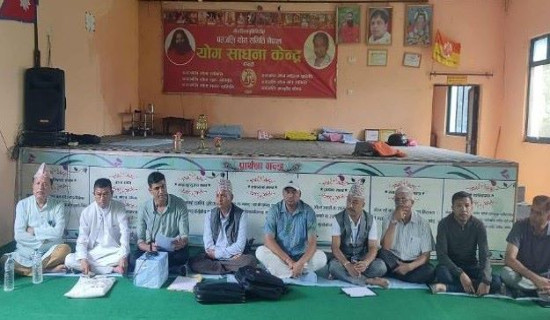- Sunday, 31 August 2025
In Throes Of Drought
Madhes Province plays a pivotal role in the production of food grains for the country. So, when it finds itself feeling from a devastating drought, the fear of food shortage reverberates across the country. This is exactly what is happening right now. The situation of drought there has become so dire that it has prompted the government to declare the province a disaster-hit zone.
An emergency cabinet meeting held on Wednesday has declared Madhes Province a disaster-hit zone as the prolonged drought during the monsoon depleted water sources and affected paddy plantations. However, the government has not announced any relief package to the farmers hardest hit by the persistent dry spell in the region. As a result, the country is on the verge of facing acute food insecurity as it is highly dependent on imported food grains in the future.
This situation should be taken as an alarm, and the government should come up with long-term solutions, as the deforestation in Chure Hills and Siwalik Range, rapid unplanned urbanisation has exacerbated the climate crisis resulting from climate change and global warming. Both federal and provincial governments are being criticised for not introducing policies to address this issue.
The government seems indifferent to renovating irrigation canals, Chandranahar, which was originally designed to irrigate 11,0000 hectares of land in Saptari, due to structural damage, is only able to operate about 60 per cent of its capacity. The government should focus on constructing more irrigation canals, as on the one hand, the water in the river is going unused and on the other hand, our agricultural lands are turning barren due to the lack of irrigation.
Likewise, the government should also focus on resilient farming. Nepal Rastra Bank's report states that the increase in GDP of Madhes will be due to an increase in agricultural produce. The dire situation Madhes is going through will affect not only the GDP of Madhes but also that of the whole country. The severe water crisis faced by Madhes and the agricultural fields left fallow during the peak time of paddy plantation will severely affect the economy of the country.
As per the news published in this daily, as of Mid-July, only about 33 per cent to 36 per cent of the 372,645 hectares of paddy have been planted. This data shows how grave the situation is; this is the time when the paddy fields should be full of rainwater and the farmers should be busy planting the paddy. However, the paddy fields have dried out and cracks are appearing in those fields. Nepal's agriculture is largely based on a rain-fed farming system. Madhes Province is grappling with a dual crisis, agricultural collapse and acute scarcity of drinking water, which is an alarming situation.
Although the government has declared Madhes a disaster-hit zone amid the drought crisis, but has not been able to formulate both short-term and long-term solutions to tackle this crisis. Due to climate change, we have lately experienced a shift in precipitation patterns. Irregular and delayed monsoons have become more common. We have to focus on afforestation, reduce over-extraction of groundwater, focus on rainwater harvesting, and encourage farmers to shift to drought-resilient crops, among other measures, to cope with the crisis.
















